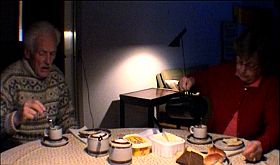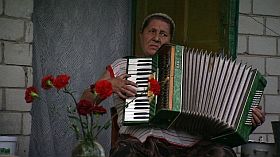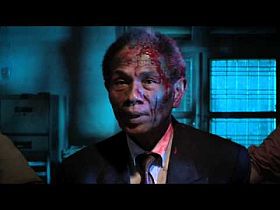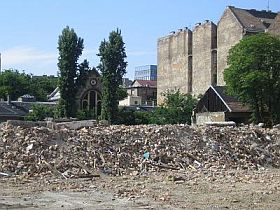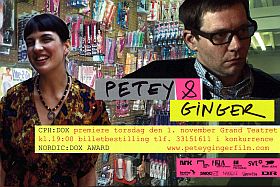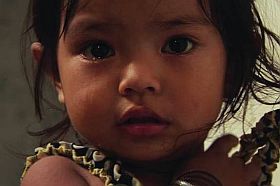Hun er den, som i sine film hele tiden er til stede, stiller sig med kameraet det rigtige sted. Filmer de sarteste, de mest sjældne øjeblikke…
DET SIDSTE DØGN (8 min, 2005)
Det er meget nøgternt, det her. På det første billede dobbeltsengen (som jeg senere vil forstå er ægtesengen) med to dyner, to puder. Det er pænt og rent og luftet. Det ses også af billedet. Så er han i billedet: Han er af den ældre generation og fra den gruppe, der brugte islandske sweatre. Han bruger sådan en trøje stadigvæk, han har den på i scenen nu. Det er ikke tilfældigt. Ingenting er tilfældigt. Han er i gang med en flyttekasse, og jeg forstår. Han skriver mærkesedler med tuschpen, klæber dem på: ”Ruths sygrej”. Jeg fornemmer, han er omsorgsfuld bag irritabiliteten. Som også er der, mærker jeg helt bestemt allerede i andet billede. Han puster af anstrengelse, det er filmens første lyd.
Hun sukker af en anden slags anstrengelse. Det er lidt senere. De er i anstrengelse de to, men forskelligt. Og de er forskellige. Hans resignerede overblik møder allerede her i den første lyd hendes konfuse given op.
Hun står i modlyset fra det andet rum. Den første dialog består af tre sætninger, som alle påbegyndes uden at fuldendes som udsagn. Og de har heller ikke med hinanden at gøre. Mærker jeg af tonefaldet.
Han ligger på sofaen. Det er han tydeligt vant til. Han planlægger og økonomiserer med kræfterne. Hun klør på. Kan ikke, tør ikke slippe den fysiske handling. Den stadige bekymring presser sig ustandseligt ind, hvad med væguret? Der er ikke plads, der er ikke så meget vægplads. Det nye sted. Og jeg forstår situationen. Ved nu, hvad jeg anede, hvad der er opbruddets indhold. Det er fra større til mindre, det er fra livsfylde til livsudtynding, det er fra glæde til resignation. Hvad, der kunne være ny begyndelse, er afslutning.
”Det er det sidste måltid i Traneholmen”, siger han med ægte galgenhumor. Da de sidder og spiser aftensmad. Og en periode, nej, livet selv, dette øjeblik, er forbi. For i adressen, i stedets navn hører jeg hele kulturen, som jeg får bekræftet af arkitekturen, som bliver tydeligere efterhånden som rummene klædes af. Denne et halvt århundrede gamle saglighed. Som holder sentimentaliteten stangen.
De har ikke haft overskud til at gøre noget særligt ud af dette sidste måltid. Han drikker øl til maden, hun mælk. Desserten er appelsiner, som har ligget lidt for længe, som er blevet tørre. ”Det er jo bedre end ingenting” lyder den afgørende sætning. Man bliver nøjsom. Filmen viser – selv yderst nøjsom – hvordan den ser ud. Nøjsomheden.
Hun og han kysser hinanden i en omfavnelse. Jeg ser det gennem vinduet, ude fra haven. Det er et ritual, jo, det er kærlighed, det er ægteskabets terminaladfærd i en nøjsomhedens erotik.
De klæder sig af, kameraet følger ham. Han børster tænder. De mødes i sengen, siger godnat. Kærligt til det høflige. Denne sidste nat, dette sidste døgn. Dette gamle sted.
NÆSTE MORGEN
Dagslyset etablerer slutspillet. Sengetøjet skal ned i sorte plasticposer. Nu er sengen tom. Jeg ser madrasserne. De er pæne og rene. Alt her er ordentligt. De sidder ved morgenmaden, samme placering, samme kameraposition som under aftensmåltidet. Men dette er ikke noget måltid, synes han, gav han udtryk for aftenen før. Hun bekymrer sig igen om flyttefolkene, det har været en tilbagevendende bekymring. Om de skal have mad, have øl, have kaffe. Han afværger hendes husmoderrutine. Denne gang energisk i sin indgriben. Han beskytter hende. Flyttefolkene er i gang. Hun sidder i den næsten tomme stue. Tavshed. Sengen er nu skilt ad. Han står i den næsten tomme stue. De står sammen i den næsten tomme stue. Tavshed.
AFSLUTNING
Mira Jargils film skildrer dette sidste døgn på otte minutter. I en kort række minimale scener, hver scene med minimalt indhold. Ser det ud til.
Men en række eksistentielle dramaer sættes i gang og føres igennem. Parallelt. Et drama af ydre begivenheder: pakke ned, spise, sove, spise, flytte, tage afsked. To dramaer af indre oplevelser og overvejelser, som jeg ved at se filmen projicerer i de medvirkende. Hans: en stor træthed, alderdommens realitet og uafviselighed mødes med økonomisering og planlægning og omhyggelig rutine med både handlinger og følelser. Resignationen er hans sammenfatning. Hendes: en boblende forvirring i de praktiske situationer med den gentagne glemsomhedsprægede omsorg for omverdenen medfører følgelig en uopmærksomhed over for livssituationen. Disse to modsatte karakterer gennemlever endvidere tilsammen deres fælles drama, hendes bekymring for alt omkring dem og hans bekymring for hende. Så meget eksistentielt på færde, så lidt udstyr scenografisk, fotografisk, tekstligt, musikalsk. Mira Jargils film er et studie i, hvor lidt man kan nøjes med.
Filmen er en afslutningens koreografi, en skildring af dette uafvendelige, som både dramaet og livet dynamisk, men i faldende takt – tøvende så at sige – peger hen mod. (Teksten har tidligere været trykt i ”FILM” nr. 47, november 2005 i engelsk version)
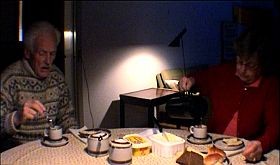
TALENTPRISEN 2011
Mira Jargil har i aften modtaget prisen Reelt Talent. Det skete under åbningsgalla arrangementet på CPH:DOX. I sin begrundelse lagde juryen vægt på ”instruktørens indlevelsesevne og fintfølende tone og så evnen til at skildre intense emotionelle situationer uden at virke anmassende og påtrængende.” Bag talentprisen, der i aften er uddelt for anden gang, står CPH:DOX og Danske Filminstruktører.
Mira Jargil har lavet tre film:
Det sidste døgn, 2005. ”Så meget eksistentielt på færde, så lidt udstyr scenografisk, fotografisk, tekstligt, musikalsk. Mira Jargils film er et studie i, hvor lidt man kan nøjes med. Filmen er en afslutningens koreografi, en skildring af dette uafvendelige, som både dramaet og livet dynamisk, men i faldende takt – tøvende så at sige – peger hen mod…” skrev jeg i DFI’s tidskrift FILM/47.
Mod målet, 2007. ”Undersøgelser viser, at 73 procent af deltagerne får et bedre liv efter at have deltaget i turneringen. Og det er netop, hvad Mira Jargils film med humor og poesi dokumenterer: Fodbold har en fantastisk socialiserende effekt…” skrev Claus Christensen på tidsskriftet Ekkos hjemmeside 23. juli 2007.
Den tid vi har, 2011. Filmen er ”med sin tyste tilstedeværelse i det intime det mest rørende og sikre værk blandt afgangsfilmene…” skrev Katrine Hornstrup Yde i Information 13. juni 2011 (Blogindlæg 01-11-2011 Allan Berg Nielsen)
DEN TID VI HAR (25 min, 2011)
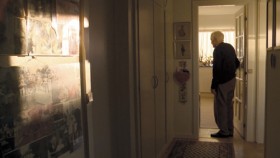
DRØMMEN OM EN FAMILIE (2013)
Billedet forestiller en familievejleder, som har måttet give op. Men nej, han skulle ikke have ladet være at forsøge at lægge sig imellem de to, ladet være at blande sig. Tvivlen, man kunne have, er for længst fjernet omkring den tvivlende. For ja, vi skal ikke kun interessere os for, men også som samfund, som socialinstitution og som kunstinstitution, som familievejleder og som filminstruktør skildre, fortolke, gribe ind i og omforme hinandens liv. Vore tankeliv, private liv, familieliv, sociale liv er ikke vore egne. Vore liv udsættes som en del af den sociale kontrol og accept for institutionernes manipulation. Når det er kommet hertil, hvad det ser ud til, det er, er det temmelig godt, at der findes psykologer som den kompetente kommunale familievejleder, den mest interessante medvirkende i Mira Jargils film og filmfolk som Mira Jargil selv, som sikrere end nogen har skildret samlivets fineste nuancer.
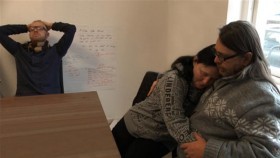
Lad mig tage ham først. Hans projekt er kolossalt, det er afgørende vigtigt, det udvikler sig kompliceret dramatisk, og han er jo i dramaet katalysatoren, den omvendte Jago, den gode, omsorgsfulde rådgiver. Imidlertid får han ikke den fortolkende plads i Jargils projekt, som filmen fortjener. Derfor mister den tilsyneladende i første omgang den intellektuelle højde, som kunne kompensere det fortvivlende følelsesbillede og den stereotype omverdensforståelse, som de andre medvirkendes replikker af talemåders begrænsede variation producerer.
Lad mig så prøve at skrive lidt om Mira Jargil. Hun er den, som i sine film hele tiden er til stede, stiller sig med kameraet det rigtige sted. Filmer de sarteste, de mest sjældne øjeblikke. Når hun kalder sin nye film ”Drømmen om en familie”, forlanger hun vist, at jeg deler den drøm, for filmen er jo ikke sådan, at den køligt konstaterer, at det er en drøm, en indbildning at kunne etablere familie uden fundament af egentlig indsigt og forståelse for hinanden. I stedet ser det ud til, at disse pseudoforståelser imellem forældrene i historien aldrig bevæger sig fra overfladens konventionelle, kliche-funderede beskrivelse af følelser. Og barnets latente originalitet i læsningen af forældrenes følelser og beskrivelser af sine egne får ikke den plads i dramaet, som ville sprænge rammerne for en tro på, at familien kan behandles, for dette ibsenske motiv er vist ikke en mulighed, ikke en fristelse for Mira Jargil. Hendes ambition er for mig foreløbig at se alene at flytte den sociale tv-dokumentar på de filmhåndværksmæssigt æstetiske områder, det observerende kamera elegant kombineret med terapeutisk hjemmevideo, karakterudvikling ved klipningen i det omfang det var muligt, smukt indforstået lyddesign og meget mere, som ingen vist kan sætte en finger på. Så det produktionsprojekt er for så vidt lykkedes. Men Jargils nye værk oplever jeg som et tilbageskridt fra den eksistensanalyse af vores fælles liv og død, som hendes tidligere film så usædvanligt rigt og klogt etablerede. Jargils nye film er således en udvidelse af hendes repertoire teknisk og administrativt og i filmlængde, en udvidelse som lykkes, men den sker vist nok på bekostning af udviklingen i den kunstneriske undersøgelse af det elskende menneske, som er at læse i det samlede værk til nu.
Ja, sådan tænkte jeg i aftes vel to tredjedele inde i den lange fortælling. Men så overraskede filmen mig. De barske begivenheder vender op og ned på forløbet. Faderen indlægges med blodprop og genoptrænes heldigt, men moderen vælger at forlade ham, for at flytte tilbage til den anden mand. Her griber psykologen og faderen til at gennemføre en smuk plan. De færdiggør den bog til barnet om det hele, som de længe har forberedt. Barnets møde med sin egen historie i den bog er filmens store sted. Den lille pige er forløst lykkelig og holder den tæt til kroppen. Læser i den, jeg hører enkelte sætninger og forstår, at denne litterære bearbejdning af det vanskeligt forståelige familieliv har helende virkning. Ikke ved sentimental bliven i en umulig drøm, men ved ærlig og præcis beskrivelse af, hvad der faktisk er sket i barnets fortid, hvad der sker nu og hvad der vil ske i fremtiden, denne klassiske kliniske model omsat til et lille stykke litteratur om drømmen, der måtte briste.
Danmark 2013, 85 min. (Blogindlæg 8. januar 2014)
ROBERT 2014
“Drømmen om en familie” er valgt som årets dokumentarfilm. Men hele Mira Jargils værk fortjener opmærksomhed. Nu bliver det spændende, om anerkendelsen får betydning for filmværkets udvikling, for den premierede film viser en helt ny retning i Jargils arbejde fra det eksistentielle til det sociale, fra det dybe til det brede, tror jeg. Det er et arbejde, som er værd at følge opmærksomt. (Blogindlæg 26. januar 2014)
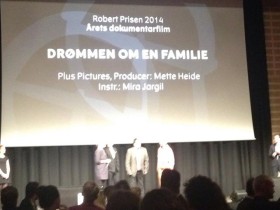
TIL DØDEN OS SKILLER (2015)
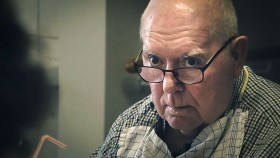
Det dokumentariske still her er uden nåde ærligt, men bag det ligger i dets filmscene også medfølelsen, som Mira Jargils og Christian Sønderby Jepsens værk, deres tv-dokumentar ikke et øjeblik forlader men langsomt undersøger og folder ud over tre aftener på TV2. Det ved Anders Kristensen, manden på fotoet godt, det er han indforstået med, han lægger alle sine muligheder for sprogets præcision ind i sine replikker og livsbeskrivelser. Han ved også godt at han skal drikke med sugerør og mades med et viskestykke under hagen resten af sin tid, men det er han imidlertid ikke indforstået med, ikke endnu. Resignationen ligger og venter, men han er ikke nået til den, han vil ikke skilles. Det er hustruen imidlertid ved at være parat til. Hans flytning til plejehjemmet er nok næste gang eller næste igen ikke den midlertidige aflastning i et kort ophold, nej, det er en flytning for al tid, en adskillelse. En skilsmisse i virkeligheden.
Jargil og Sønderby Jepsen har to ledende medvirkende mere, en mand og en kvinde i samme situation. Denne mand, Vagn Nielsen er som Anders Kristensen tæt på opgivet af sin hustru, som ikke længere kan trænge igennem til hans lukkede tankeverden, ikke leve med hans svigtende hukommelse. En lang intens scene skildrer begivenheden hvor hans hånd på hans vegne nægter at skrive under på ansøgningen om en plejehjemsplads. Mildt beslutsomt skriver en datter under scenens stille, nervøse venten endelig under på hans vegne. Hans hånd har resigneret og han er skilt i virkeligheden.
Anna Bjørslev er alene i sit store hus, hendes mand er død for et år siden, hun sidder kraftesløs i sin stol, må have hjælp til alt. Flere gange gange om dagen. Døden har skilt hende fra hendes mand, hun er fri til at vente sin egen død, men er uden kræfterne ikke fri nok til selv at afgøre på hvilken måde. Hendes tre døtre tager blidt håndfast affære, overtaler hende og gennemfører først besigtigelsen af den tilbudte bolig derefter flytningen til plejehjemmet.
Instruktørerne kalder i deres synopser tv-serien entertaining og debatskabende. Sådan ser jeg den slet ikke, men måske nok som poignant som de også skriver, mest i betydningen smertefuld. Det gør bestemt ondt at se serien når den (ind imellem sit påpegende og tydeliggørende tv-pligtstof hvad der er meget af) fordyber sig i filmscenernes sarte og sjældne øjeblikke. Som når Anders Kristensen som på fotoet ser på mig med et intenst blik over brillerne, i episode 2 er på aflastning og i en kort, vemodig monolog beskriver døgnene på plejehjemmet:
Den uge jeg har været her den føles faktisk som to måneder. Der er tre værelser til dem der er herinde på aflastning og så resten her til fastboende demente. Der er en kvinde der åbner døren engang imellem. Hun gør som en hund. Hun tror hun er en hund. Der er en mand der åbner døren. Han har stråhat på og en dukke i hånden som han sidder og leger med… Du kan høre, hvad der sker… en der råber, en der skriger…
For mig har Mira Jargils og Christian Sønderby Jepsens rystende dokumentarserie frem for noget underholdende og debatskabende været et personligt alarmkald. Jeg må altså nu, i tide, ved mine sansers og lemmers fulde kraft tage det her i egen hånd, ikke vente på familiens umulige nåde, men selv og alene forberede mig på adskillelsens konsekvens, i tide selv forhandle med pårørende og sociale myndigheder, selv og alene beslutte detaljerne og få dem testamentarisk stadfæstet ved min egen hånds underskrift. Sådan må tv-serien blive et alarmkald for mange. (Blogindlæg 7. februar 2016)
FILMOGRAFI
I NETTO har alle råd. Filmede en del af de dengang berømte dokumentariske reklamefilm for NETTO (sammen med sin far Jesper Jargil, som producerede) vist nok før 2007.
Det sidste døgn, 2005. Bedsteforældrene, Ruth og Arne flytter fra huset til den lille lejlighed.
Mod målet – VM for hjemløse, 2007. Sejre og skuffelser, knuste håb og levende drømme i en hjemløs fodboldspiller.
Grace, 2010. En kvindelig taxichauffør i Beirut, som kun kører med kvindelige passagerer i sin pink bil. Helst vil hun noget helt andet.
Den tid vi har, 2011. Ruth er døende og Arne må tage afsked med hende, med sit livs kærlighed.
This is My Family, 2012. To brødre i en polygam familie i Uganda har forskellige mødre og samme far. Brødrene holder tæt sammen, men deres mødre kan ikke udstå hinanden. (Et DOX:LAB samarbejde med instruktøren Fred Kigozi, Uganda)
Drømmen om en familie, 2013. En mand med mange og svære problemer arbejder heroisk på at genskabe sin lille splittede familie, få kæresten til at komme tilbage, få deres fjernede barn hjem. Men forhindringer dukker hele tiden op. Kan ses på Filmcentralen: http://filmcentralen.dk/alle/film/drommen-om-en-familie
Til døden os skiller (2015) ,sammen med Christian Sønderby Jepsen, tv-serie i tre episoder, 3×40 min. Om ikke at kunne klare sig selv mere, når sygdommen tager overhånd og flytning til plejehjem står for. TV2 sender de tre afsnit 20:00 den 11. 18. og 25. februar 2016. Kan efter 1. marts 2016 ses på Filmcentralen



